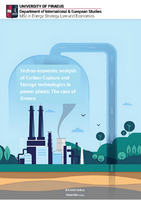Techno-economic analysis of carbon capture and storage technologies in power plants : the case of Greece

Master Thesis
Συγγραφέας
Bikakis, Orfeas
Μπικάκης, Ορφέας
Ημερομηνία
2023-12Επιβλέπων
Polemis, MichaelΠολέμης, Μιχαήλ
Προβολή/
Λέξεις κλειδιά
Carbon Capture and Storage (CCS) ; Power plants ; Techno-economic analysis ; Greece ; Greenhouse gas emissions ; Economic viabilityΠερίληψη
With increasing worries about the effects of climate change and the harmful implications of increased greenhouse gas emissions, carbon capture and storage (CCS) technology adoption has become a higher priority in the global energy landscape. This thesis investigates CCS implementation in the context of power production, with a specific emphasis on its prospective application in a natural gas-fired power plant in Greece.
The thesis starts with an extensive review of the available technologies for carbon capture, transportation, and storage, indicating all their technical aspects. The examination of global and domestic CO2 storage capacity sets the groundwork for understanding the feasibility of CCS deployment.
Methodologically, the thesis outlines a rigorous data collection process, utilizing advanced analysis techniques and models to assess the viability of CCS technologies. The overview of power generation in Greece that follows, offers information on the country's current energy mix, regulatory rules, and emission profiles of the power plants.
The study also explores the policies surrounding CCS implementation, analyzes the European framework for deployment, and evaluates Greece's decarbonization strategy. In addition, potential sources of funding for these projects are discussed to assess the financial aspects of integrating CCS technologies into Greek power plants.
Following that, the techno-economic study assesses the potential of various technologies, considering their cost and performance characteristics as well as the barriers to their adaptation. The study involves a cost estimation, a performance rating, and an economic feasibility assessment. Based on the findings, a case study is carried out to show the use of the most efficient technology in a selected power plant.
The conclusions of the cost and performance analysis, the economic feasibility evaluation, and the discussions of environmental advantages and problems are presented in the final chapter. Policy implications and recommendations are offered, with an emphasis on the policy framework, economic incentives, and finance mechanisms essential for effective CCS implementation. The purpose of this research is to inform stakeholders and policymakers so that they may make better decisions for a more sustainable future.


